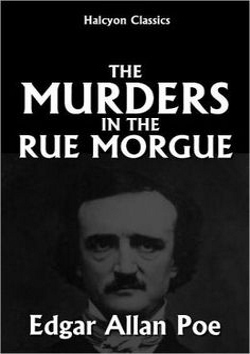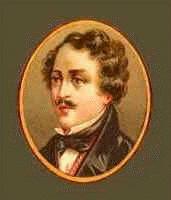Legendary Detectives: C. Auguste Dupin

I love mysteries. Nothing is more fun than becoming one of my favorite detectives with a good puzzle to solve. I know that most crime is uncomplicated. The bulk of it is stupid, banal, and squalid. There is little criminal genius in the real world, and our Moriartys are up to financial fraud, not “murder most foul.” Still, I can, and do, suspend disbelief gladly when I pick up a new novel or short story because I love being an investigator, a profiler, a criminologist, or a forensic expert—a sleuth of any stripe.
In this series of posts, I want to share with you some of my encounters with legendary detectives. I’ve followed some closely, been briefly introduced to others, but only know some by reputation. Let me share a few interesting things I know about them. I’m sure that you can list others that I will not include. And I’m equally sure that you know things about each of them that I will fail to mention. This list is a personal one. I make no claim to authority. As with all “best lists,” people will differ. That’s great. As they say, “a difference of opinions is what makes a horse race.”
Jonathan Kellerman has Alex Delaware remark that his friend Milo Sturgis is the only detective he knows that has actually detected anything. A detective goes about detecting by collecting physical evidence and asking questions. This “legwork,” is time-consuming whenever he gets a case without an obvious “who” that “did it.” Real life detectives handle such cases but rarely. The fictional ones do it every time, or else there would be no story for us to climb into.
Let’s take a look at the first detective, Edgar Allen Poe’s C. Auguste Dupin from “The Murders in the Rue Morgue” (1841), and “The Mystery of Marie Rogêt” (1842), followed by “The Purloined Letter” (1844). (I’ll not argue whether other detectives have a better claim to being first. If we have a difference of opinion, that’s good. It makes for stimulating conversation.)

C. Auguste Dupin
A professional detective, be he a cop or a private investigator, has time for the extensive legwork required because that’s the job. Amateur detectives, however, must find the time and have the money to pursue their cases. That’s why mystery writers often create detectives who are people of leisure with adequate resources. History supplies us with just such people. Beginning during the scientific revolution of the 17th century and continuing through the 19th century, some gentlemen of the nobility devoted their time, resources, and energy to advancing scientific knowledge. Robert Boyle, Henry Cavendish, and Antoine Lavoisier were of the nobility. Charles Darwin was a wealthy and connected doctor’s son. So when Poe chose a man of leisure for his detective, he followed historical precedent.
The narrator who introduces Le Chevalier (Sir) C. Auguste Dupin calls him “that unusual Frenchman.” Dupin’s once-rich noble family has apparently left him only modest means and its prestigious rank. He is a socially unattached man and eccentric. His life is books and a voyeuristic interest in the people among whom he moves with minimal and shallow interaction. He is coldly rational, egotistical, intellectually snobbish, and abrupt to the point of rudeness. Dupin is all brains and no soul. How that works with his being an amateur poet, I have no idea. He is obsessed with puzzles and enigmas. He doesn’t really care for abstracts like “justice.” Nor does he worry overmuch about the falsely-accused. He burns to solve the case for the mere satisfaction of solving it. In short, he’s brilliant and interesting, but not a nice guy. Does that sound like another detective you know? (Hint: he also has a sidekick who chronicles his cases.)
 So how does this genius go about the job? He collects facts and then uses both sides of his brain. He pays intense attention to the details, especially the ones that seem to make no sense. He also notices what people do not say as well as what they do say. Dupin is adept at reading people. He notes their hesitations, their manner, their expressions, and their body language. You wouldn’t want to play poker with this strange fellow. The exact “how” leads to an understanding of the “why” which reveals the “who.” He applies a combination of cold logic and creative imagination to get into the head of the criminal. I suppose that makes him the first profiler as well as the first detective.
So how does this genius go about the job? He collects facts and then uses both sides of his brain. He pays intense attention to the details, especially the ones that seem to make no sense. He also notices what people do not say as well as what they do say. Dupin is adept at reading people. He notes their hesitations, their manner, their expressions, and their body language. You wouldn’t want to play poker with this strange fellow. The exact “how” leads to an understanding of the “why” which reveals the “who.” He applies a combination of cold logic and creative imagination to get into the head of the criminal. I suppose that makes him the first profiler as well as the first detective.The Murders in the Rue Morgue
Published on April 02, 2016 07:59
•
Tags:
detective-fiction, detectives, dupin, mystery, poe, profiler, rue-morgue
No comments have been added yet.
Musings and Mutterings
Posts about my reading, my writing, and thoughts I want to share. Drop in. Hear me out. And set me straight.
- A.R. Simmons's profile
- 59 followers



